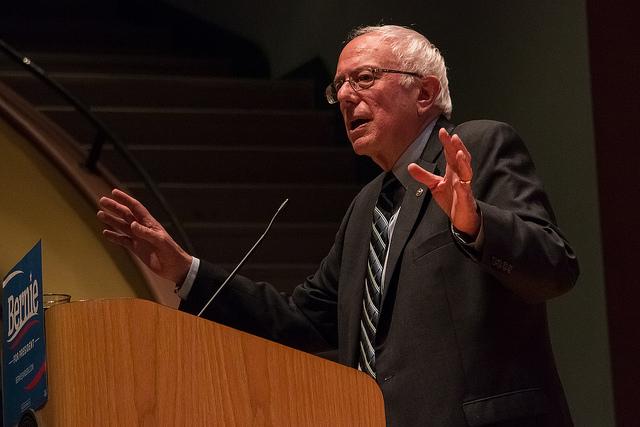
Honest, paywall-free news is rare. Please support our boldly independent journalism with a donation of any size.
Cedar Rapids, Iowa – Hillary Clinton never utters his name.
But Bernie Sanders is always there. Garnering the largest crowds of the presidential race. Raising millions of dollars, more than nearly every other candidate of either party. And boasting a following that can only be described as intense.
Over the weekend, he received a raucous reception in the early nominating state of Iowa at the first joint appearance of the Democratic candidates, with supporters banging their fists on the table, clinking silverware against glasses and interrupting him with their enthusiasm. “Preach!” shouted one woman.
Clinton still boasts the highest poll numbers and a record amount of money raised. Now the surprising popularity of Sanders, the 73-year-old self-described socialist who relishes being a champion of the underpaid, overworked American worker, means Clinton will have to spend money and effort for a nomination many assumed was hers for the taking.
“Bernie is authentic,” said Kurt Meyer, Democratic chairman of a trio of rural counties in north-central Iowa, who has not endorsed a candidate. “He has a fervor in his message that connects with people.”
In late May, the senator from Vermont appeared at a community center in the tiny town of Kensett in Meyer’s part of the state. The campaign had hoped to lure 100 people, more than a third of the town’s population, but 300 showed up. Meyer said the supporters were so enthusiastic organizers decided to pass a bucket to raise money. They collected $1,200.
On Saturday, Sanders drew more than 11,000 people to a rally in downtown Phoenix, his largest crowd yet, to hear him blast this nation’s income inequality, “billionaire class” and big, unaccountable money in politics.
Sanders’ strengths – rallies attracting thousands, more money from small donors reflecting support from everyday Americans, an enthusiastic Twitter following that uses the hashtag #FeeltheBern – have taken some Clinton supporters by surprise even as they insist they always knew she’d have to work for the nomination.
“It concerns me,” said Donald Fowler, a former Democratic National Committee chairman who is close to the Clintons. He does not think it will cause Clinton to lose the nomination. “She’ll be fine,” he said.
Still, Fowler said he hopes she learns some lessons from Sanders about the importance of holding larger events and speaking matter-of-factly about working Americans. “I think she needs to create an emotional link to average Democrats,” he said.
Clinton delivered one of her most aggressive speeches at a party dinner Friday in Cedar Rapids, earning sustained applause and chants of “Hill-a-ree!” She did so by blasting the Republican candidates for president, not mentioning her closest Democratic rival.
Sanders gave his own passionate speech, which began with his voice raised right from the start, as he referred to a “political revolution” and said over and over “enough is enough!”
Nicholas Johnson, a former Federal Communications Commission commissioner who teaches at the University of Iowa, said he is more enthusiastic about Sanders than any other candidate he has supported since the 1940s.
Johnson, clad in a light blue “Bernie for President” T-shirt, described Clinton as the establishment candidate. “I think the establishment is the problem,” he said.
Oftentimes, Sanders’ supporters appeared to be more enthusiastic than Clinton’s, though the cheers were only coming from parts of the room, a sign his progressive views do not appeal to all Democrats.
“I don’t think he can unite the party,” said Joni Gillispie, 58, of Burlington, who wore one Hillary Clinton button, one Bill Clinton button and one of the couple. “He’s going to take the moderates and drive then over to the other side.”
Several Democratic activists said they prefer Sanders, but are conflicted because they think Clinton is the one who could beat a Republican candidate.
“We want someone who can win,” said Dallas Knapp, 20, a student at Loras College in Dubuque who grew up in Bloomington, Ill.
Clinton maintains a big lead in polls nationally. She leads in early primary states as well, though Sanders is gaining there.
Andrew Smith, the director of the University of New Hampshire Survey Center, cautioned not to read too much into Sanders’ numbers. He said historically that 35 to 45 percent of the Democrat electorate in New Hampshire usually favors a non-establishment candidate, such as Howard Dean, Bill Bradley or Gary Hart, but that doesn’t mean they will win. “What you are seeing with Bernie Sanders is not unusual,” he said.
And Sanders’ enthusiasm does not necessarily translate into having the infrastructure to run a nationwide campaign.
Clinton has dispatched more than 100 paid staffers across the nation to recruit volunteers. Sanders is still ramping up in early states and non-existent in other states.
In North Carolina, state party chairwoman Patsy Keever said many liberals are excited about Sanders though he does not have a presence there.
In Florida, another key swing state, the party’s executive director, Scott Arceneaux, said he has seen a lot of activity from Clinton’s campaign, including the arrival of a paid organizer, a visit by campaign manager Robby Mook and an appearance by Clinton herself. Other candidates have been there for fundraising, but not much else.
Arceneaux said Sanders’ campaign just contacted him last week to tell him the campaign had hired a Southern regional staffer and are starting to build up. But Arceneaux said it will be hard to compete with Clinton.
“The Clintons are very popular in Florida,” he said.
Press freedom is under attack
As Trump cracks down on political speech, independent media is increasingly necessary.
Truthout produces reporting you won’t see in the mainstream: journalism from the frontlines of global conflict, interviews with grassroots movement leaders, high-quality legal analysis and more.
Our work is possible thanks to reader support. Help Truthout catalyze change and social justice — make a tax-deductible monthly or one-time donation today.